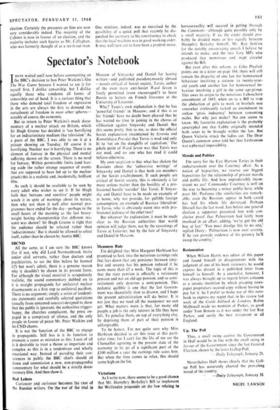Red Letters
Curiouser and curiouser becomes the case of the Rutsian writers. On the eve" of thi trial in Moscow of Sinyaysky and Daniel for having written—and published pseudonymously abroad —novels critical of Soviet society, Tarsis, author of the even more anti-Soviet Ward Seven is freely permitted (even encouraged?) to leave Russia to lecture on French literature at the University of Leicester.
Why? Tarsis-s own explanation is that he has `powerful friends' in Moscow; and if this is so his 'friends' have no doubt been pleased that he has wasted no time in joining in the chorus of vilification against Sinyaysky and Daniel. But this seems pretty thin to me, as does the official Soviet explanation (maintained by lzvestia and Komolskaya Pravda) that Tarsis is mad and only fit to 'rot on the dunghills of capitalism.' The whole point of Ward Seven was that Tarsis was not mad, and no one who has read it could believe otherwise.
My own suspicion is that what has shaken the Russians about the 'subversive writings' of Sinyaysky and Daniel is that both are members of the Soviet establishment. If such people are critical of Soviet society, this is obviously a far more serious matter than the hostility of a pro- fessional hostile 'outsider' like Tarsis. If Sinyav- sky and Daniel have to be made an example of at home, why not provide, for gullible foreign consumption, an example of Russiaa 'liberalism' in Tarsis, who is obviously eaten into with pro- fessional jealousy of the other two?
But whatever the explanation, it must be made clear to the Russian authorities that world opinion will judge them, not by the cavortings of Tarsis at Leicester, but by the fate of Sinyaysky and Daniel in Moscow.


































 Previous page
Previous page